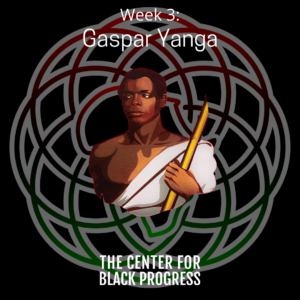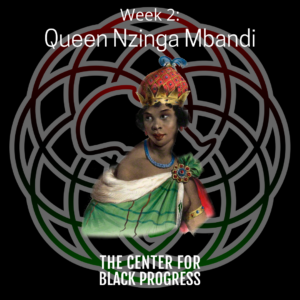
The Ancestor's Story

Queen Nzinga a Mbandi, known simply as Queen Nzinga (a.k.a. Zinga or Njinga), lived from 1583-1663 in pre-colonial Angola. Her name comes from the Kimbundu word kujinga, which describes a child born with the umbilical cord wrapped around his or her neck. To the Ndongo people, this occurrence means that the child will grow to be proud and wise.Queen Nzinga came to power after the death of her brother, and subsequently ruled the Ndongo Kingdom for 37 years. This was despite the expectation that she would have made one of her husbands king. Instead, she chose to keep the title for herself! Many were outraged by this, but after seeing the way she led the charge into battles, among other exploits, they soon saw that she deserved the crown.
The most significant tests of her power came from dealings with the Portuguese and neighboring African slave traders, during one of the high-points of the Trans-Atlantic Slave Trade. The Queen employed various methods of cunning to maintain her kingdom’s sovereignty. To eliminate slave trade within her territory, she formed an alliance with the Portuguese by converting to Christianity via baptism. When this ally later turned on her, she teamed up with the Dutch in attempts to turn the tables. To bolster her loyalty and fighting forces, she made her kingdom a haven for runaway slaves fleeing the Europeans.
Complementary to her diplomatic intelligence, Queen Nzinga refused to allow any entity to treat her as less than royalty. In a legendary meeting with the Portuguese governor, Correia de Sousa, Nzinga made a statement that has reverberated throughout the ages. The governor, wishing to put the Queen “in her place,” offered her a plain floor mat meant for subordinates, while he sat regally in a chair. Always showing a skill for cool-headed adaptation, Queen Nzinga promptly ordered one of her aides to form a human chair. After making herself comfortable upon his back, she continued with the meeting on equal terms, eye-to-eye with her pseudo-superior.
Eventually, Queen Nzinga lost her main territory due to a betrayal by the Portuguese. She moved further west to establish a new state, Matamba. It was then that she partnered with the Dutch and began taking in fugitive slaves. By the time of her death, she had grown her new territory back to a level of equality with local Portuguese strength, signing a peace treaty in a stalemate years earlier. After spending most of her 60’s and 70’s fighting, she died in peace at the age of 80.
The Ancestor's Achievements
- Displayed the power of WOMAN, proving herself as one of the most memorable female rulers ever
- Stood toe-to-toe with the Portuguese empire, continuing to fight even after defeats
- Served as one of the main inspirations for 20th century Angola freedom-fighters
- Served as one of the main inspirations for the People’s Movement for the Liberation of Angola, which gained independence from Portugal in 1975
Keys to Greatness
In the face of patriarchal tradition, Queen Nzinga a Mbandi was brave, confident and capable enough to declare herself “King.”
Queen Nzinga was a leader who led by example. She was a leader who led “from the front.” She was the first to charge into armed combat. She showed her aides firsthand how to demand respect and dignity by her refusal to be belittled by the Portuguese governor.
Queen Nzinga demonstrated a keen awareness of her environment. She found ways to cope with encroaching colonists and treacherous African slavers through political demonstrations and alliances. She also showed the flexibility to change these strategies at a moment’s notice.
Queen Nzinga maintained the sovereignty of her kingdom throughout her entire rule–almost four decades. Even in her elder years, she held on to the vigor to fight. As a result, she inspired her descendants to finish that fight over three centuries later.


